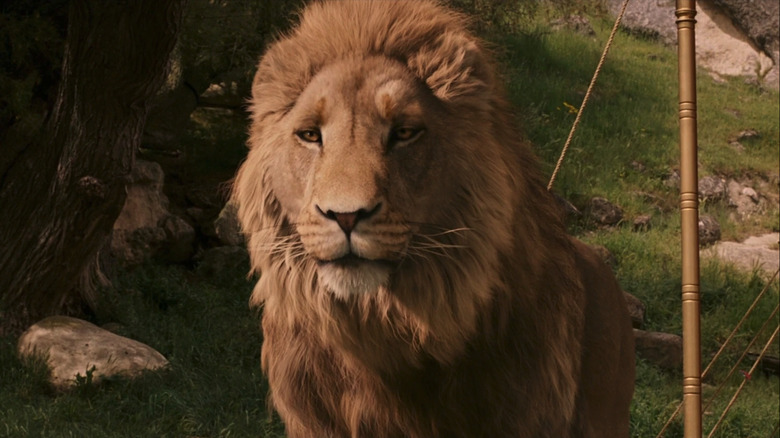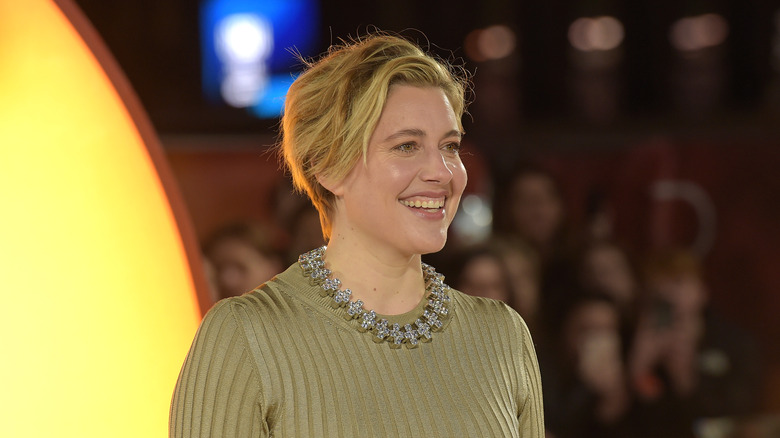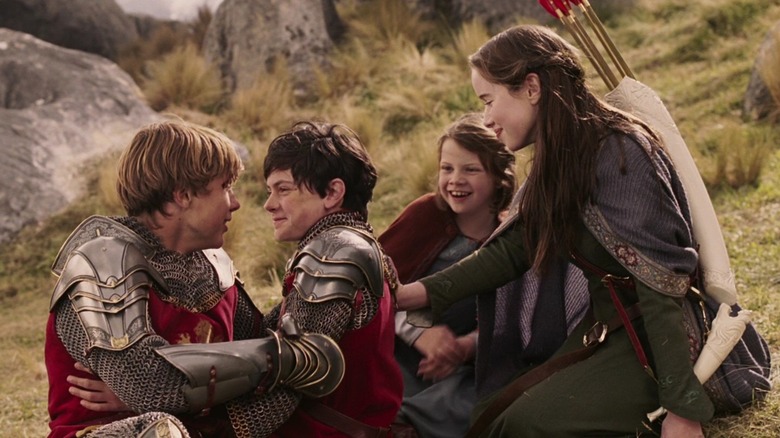Greta Gerwig's Narnia Will Be 'Rooted In Faith' - Here's What That Means
There's nothing like a director on a hot streak. Just ask Greta Gerwig. In a bleak Hollywood landscape disrupted by labor strikes, artificial intelligence, and concerns about profitability, studios are pulling back on their streaming investments. And yet, even as Gerwig is still riding high on her "Barbie" success, she's already preparing to seamlessly transition into her next big-ticket item: a pair of "Chronicles of Narnia" movies. The "Narnia" books are among the director's childhood favorites, and she has expressed a deep sense of care and concern as she prepares to reboot the film franchise. She's gone so far as to say that she's properly scared of the enormous task of bringing such a beloved story to life.
In a recent feature on Gerwig for Time's Women of the Year series, Netflix CEO Ted Sarandos put in his two cents on the director's capabilities to adapt the heartwarming IP, stating, "It won't be counter to how the audience may have imagined those worlds, but it will be bigger and bolder than they thought." Sarandos also described Gerwig's world-building for the upcoming movies as "'rooted in faith' much like [author C.S.] Lewis' original material."
Netflix bought the rights to Lewis' iconic stories back in 2018. At the time, Sarandos commented to Deadline, "C.S. Lewis' beloved Chronicles of Narnia stories have resonated with generations of readers around the world. Families have fallen in love with characters like Aslan and the entire world of Narnia, and we're thrilled to be their home for years to come."
Fast forward over half a decade, and that emphasis on faithfulness to the heartwarming, multi-generational appeal of Lewis novels is still on everyone's minds — even if Sarandos' mention of a more ambitious "Narnia" adaptation does hint at some adaptive creativity to come.
Gerwig is planning a magical return to Lewis' world
What are Greta Gerwig's thoughts on the challenge of a (literally) faithful adaptation of Narnia? They can be summed up in one word: magical. The director told Time, "I'm trying to make it magical. I want to make it feel like magic. C.S. Lewis said that the goal of writing fantasy – you know, something from his imagination – he'd say, let's say you wrote about an enchanted forest. The goal would be that then, every time you walk into a forest after you read it, you say to yourself, 'Maybe this is an enchanted forest.'"
Gerwig is likely referencing the book "On Stories: And Other Essays on Literature," in which Lewis refers to the longing of a child for fairy stories thusly, "Fairy land arouses a longing for he knows not what. It stirs and troubles him (to his life-long enrichment) with the dim sense of something beyond his reach and, far from dulling or emptying the actual world, gives it a new dimension of depth. He does not despise real woods because he has read of enchanted woods: the reading makes all real woods a little enchanted."
Along with a generally magical feel, Gerwig appears uniquely suited to bring a faith-based focus to Lewis' Christianity-infused novels. In November of 2023, Netflix's Film Chief, Scott Stuber, said (via Variety) in relation to Gerwig being an excellent candidate to helm the first Narnia films,"[Gerwig] grew up in a Christian background. The C.S. Lewis books are very much based in Christianity."
Stuber isn't wrong on that last account. Lewis' books are dripping in faith-based imagery — an essential element that must remain prominent if an adaptation is going to truly be "rooted in faith."
Channeling Christianity on page and screen
One need not look far to see the major Christian elements in "The Chronicles of Narnia." It is immediately apparent right in the most famous book of the bunch, "The Lion, the Witch, and The Wardrobe." In that novel, we see a fallen world trapped by evil, blood atonement for treachery and sinful acts, and, of course, the Christ-like sacrifice of Aslan as a willing substitution to redeem Edmund.
The Christian imagery holds up throughout the other six books in the series. "The Magician's Nephew" depicts a Narnia origin story that is strikingly similar to the first few chapters of the Book of Genesis. The final book in the series, "The Last Battle," parallels the apocalyptic events of the Book of Revelation. In between, there are endless Christian call-outs and parallels.
It bears pointing out that C.S. Lewis's novels aren't pure allegory. Every character doesn't have a clear symbolic real-world parallel. Instead, Lewis referred to his style of fantastical allegory as a "supposition" that explored other fictional stories based on Christian parallels. Greta Gerwig is clearly aware of the unique combination of fantastical yet purposeful storytelling. "As a child," she told Time, "you accept the whole thing—that you're in this land of Narnia, there's fauns, and then Father Christmas shows up. It doesn't even occur to you that it's not schematic. I'm interested in embracing the paradox of the worlds that Lewis created, because that's what's so compelling about them."
Gerwig's desire to recapture the magic of the past will depend on her ability to create her own version of Lewis' stories in a way that maintains their enchanting qualities while preserving that Christian throughline that gives them so much purpose to so many people.


